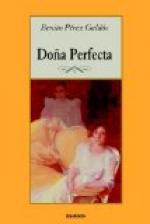“That is the way with him,” continued Dona Perfecta, “always pretending to know nothing. And he knows more than the seven doctors put together. Ah, Senor Don Inocencio, how well the name you have suits you! But don’t affect an unseasonable humility now. Why, my nephew has no pretensions. All he knows is what he has been taught. If he has been taught error, what more can he desire than that you should enlighten him and take him out of the limbo of his false doctrines?”
“Just so; I desire nothing more than that the Senor Penitentiary should take me out,”—murmured Pepe, comprehending that without intending it, he had got himself into a labyrinth.
“I am a poor priest, whose only learning is some knowledge of the ancients,” responded Don Inocencio. “I recognize the immense value, from a worldly point of view, of Senor Don Jose’s scientific knowledge, and before so brilliant an oracle I prostrate myself and am silent.”
So saying, the canon folded his hands across his breast and bent his head. Pepe Rey was somewhat disturbed because of the turn which his mind had chosen to give to an idle discussion jestingly followed up, and in which he had engaged only to enliven the conversation a little. He thought that the most prudent course to pursue would be to end at once so dangerous a debate, and for this purpose he addressed a question to Senor Don Cayetano when the latter, shaking off the drowsiness which had overcome him after the dessert, offered the guests the indispensable toothpicks stuck in a china peacock with outspread tail.
“Yesterday I discovered a hand grasping the handle of an amphora, on which there are a number of hieratic characters. I will show it to you,” said Don Cayetano, delighted to introduce a favorite theme.
“I suppose that Senor de Rey is very expert in archaeological matters also,” said the canon, who, still implacable, pursued his victim to his last retreat.
“Of course,” said Dona Perfecta. “What is there that these clever children of our day do not understand? They have all the sciences at their fingers’ ends. The universities and the academics teach them every thing in a twinkling, giving them a patent of learning.”
“Oh, that is unjust!” responded the canon, observing the pained expression of the engineer’s countenance.
“My aunt is right,” declared Pepe. “At the present day we learn a little of every thing, and leave school with the rudiments of various studies.”
“I was saying,” continued the canon, “that you are no doubt a great archaeologist.”
“I know absolutely nothing of that science,” responded the young man. “Ruins are ruins, and I have never cared to cover myself with dust going among them.”
Don Cayetano made an expressive grimace.
“That is not to say that I condemn archaeology,” said Dona Perfecta’s nephew quickly, observing with pain that he could not utter a word without wounding some one. “I know that from that dust issues history. Those studies are delightful and very useful.”




